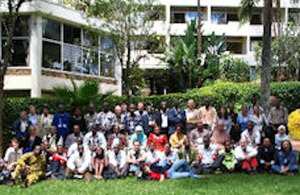DFID Research: Supporting science journalism in Africa and the Middle East
The DFID-funded SjCOOP Programme has helped to train twelve new teams of science journalists in Africa and the Middle East.

SjCOOP journalists. Picture: SjCOOP
A dozen new teams of science journalists from different countries across Africa and the Middle East are collaborating on science related stories. Their articles are in demand from local editors, and their approach is trusted by local scientists. Editors of 8 African newspapers, 3 magazines, 2 national news agencies, and the internationally respected SciDev.Net have published stories written by teams of mentees from different countries.
These teams were developed through the DFID-funded Support of Science Journalism in the Developing World Programme (SjCOOP) by building networks of professional scientists, and through working with the World Federation of Science Journalists to foster regional and national associations of journalists.
SjCOOP offered in situ distance training in science reporting to 40 African and Arab journalists in 21 countries. The training was based on a mentor-mentee approach and an extended 2-year support system, using mentors which are established science journalists in Europe and North America. The journalists received training in the basic skills of science reporting but - because the training was offered by peers - they also received ‘real-time’ advice on how to develop their careers as science journalists. The peer-to-peer approach made sure, from the outset, that trained journalists would get relevant advice, not only in the basic skills of science reporting but also in how to develop their career as science journalists, including how to pitch stories to editors, and how to find freelancing opportunities.
A further 12 people trained as journalist trainers. Through the creation of 11 associations of science journalists and the support of the training activities of associations, the project has also trained dozens of other journalists. The SjCOOP journalists in turn contributed to creating the first ever online course in science journalism, which is available in Arabic, English, French, Portuguese and Spanish. The course has been used in several universities, particularly in South Africa. Several of the SjCOOP journalists have also organized their own training workshops for other journalists and two have become professors of science journalism in universities.